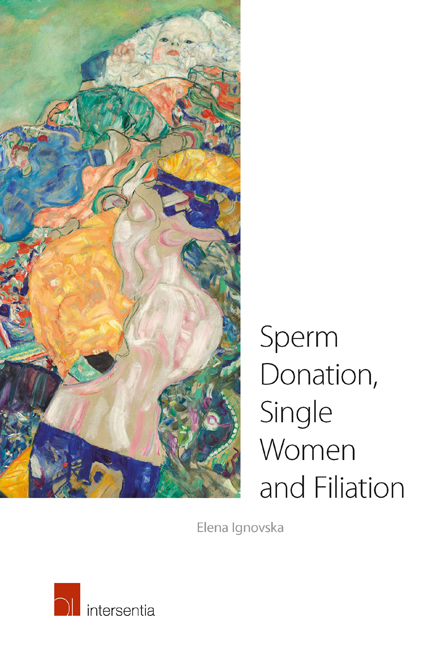Book contents
Foreword
Published online by Cambridge University Press: 12 December 2017
Summary
On 10 September 2014, Ghent University Law School (Belgium) awarded Elena Ignovska the degree of Doctor of Law. It was my privilege to supervise her three year research project resulting in this doctorate, which was funded by the Basileus Erasmus Mundus Action 2 Programme of the European Commission. The present volume is the commercial edition of her dissertation, which was entitled “Affiliation of Children Conceived by Sperm Donation to Single Women: The (Im)possibility to Establish Fatherhood from an International Perspective with a Focus on the Republic of Macedonia”.
This book holds a methodologically well thought-out analysis of the complex and captivating issues connected with deliberate solitary motherhood both in international law and in the national law of ten European countries. It is a legal dissertation based on empirical, sociological and ethical literature. This multifaceted approach helps to develop the author's argument. Discussing the topic from interdisciplinary, national and international viewpoints and in a historical context offers a clear perspective for finding universal solutions. This opens the until now mostly nationally perceived field of family law up to international observation, and thus enhances the discussion on affiliation in the Macedonian family law context.
From a fitting abstract position, the author offers in Part II an original analysis using three different perspectives: the standpoint of the single mother with the desire to have children, the viewpoint of the sperm donor, and thirdly the perspective of the children, born of single mothers who were fertilised with donor sperm. One of the key issues is whether the right to have access to assisted reproductive technology of the deliberately solitary mother combined with the protection of the donor's anonymity isn't inevitably in conflict with the child's fundamental human rights, including the right to know one's genetic identity, the right to family life (and to have a relationship with one's parents) and the right to due process. The author makes a comparative assessment throughout the whole thesis, by collating the position of children born of single mothers fertilised with sperm from an anonymous donor and the position of children of heterosexual couples or (of secondary importance) of children born to single mothers whose fathers are known.
- Type
- Chapter
- Information
- Sperm Donation, Single Women and Filiation , pp. vii - viiiPublisher: IntersentiaPrint publication year: 2015
- 1
- Cited by

